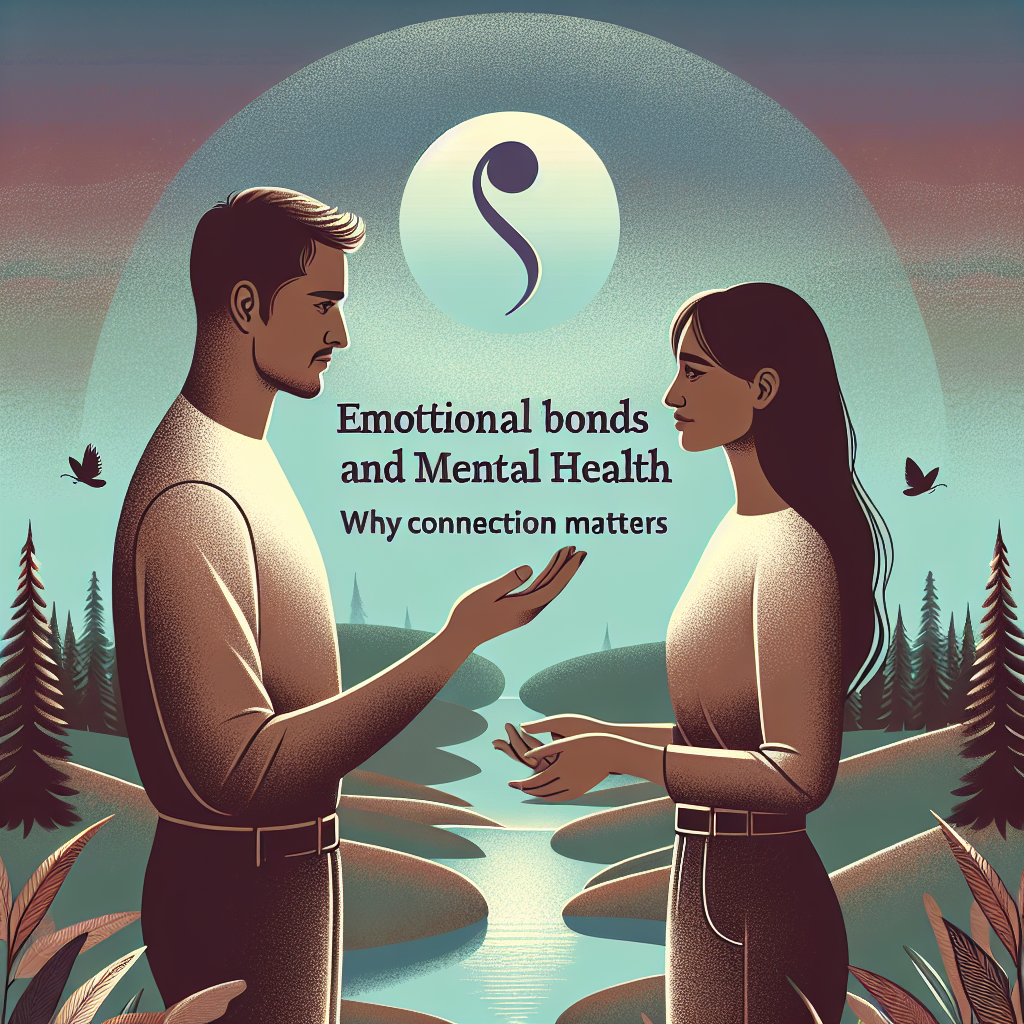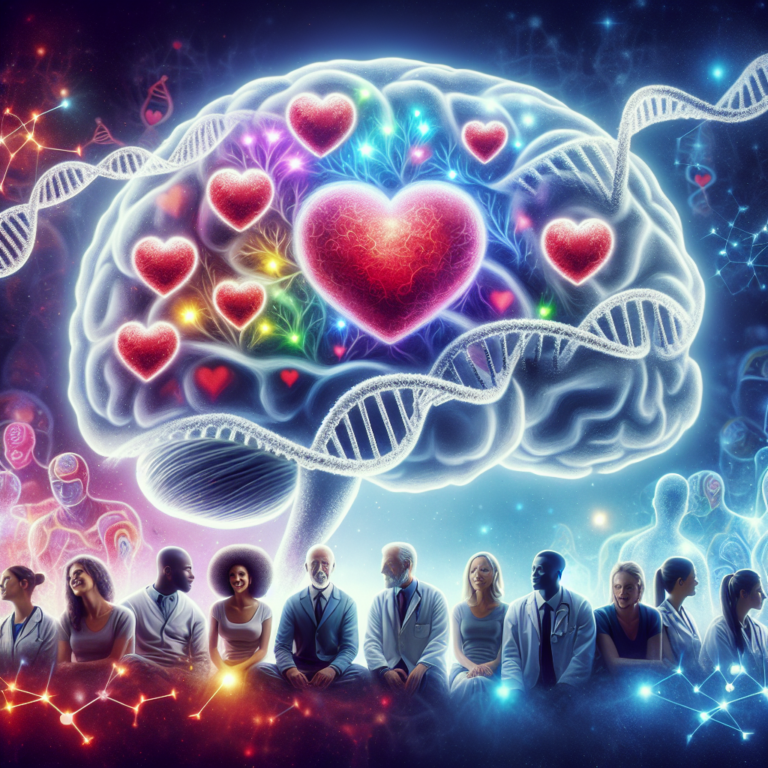
Introduction
In today’s fast-paced world, many find themselves on a lonely island despite being surrounded by people. Studies show that emotional bonds significantly influence mental health, yet connection often gets sidelined in our daily lives. Whether it’s the comforting embrace of a friend, a heartfelt conversation with a family member, or even the supportive gesture of a colleague, the emotional bonds we forge play a vital role in our psychological well-being.
This article explores Emotional Bonds and Mental Health: Why Connection Matters. We delve into the science behind emotional connections, examine real-world case studies, and provide actionable insights to help you nurture these essential bonds. Get ready to discover how strengthening your relationships can profoundly impact your mental health.
The Science Behind Emotional Bonds
Understanding Emotional Bonds
Emotional bonds can be defined as the strong ties formed between individuals through shared experiences, mutual understanding, and affection. These connections manifest not only in personal relationships but also in professional settings. The emotional resonance one feels in a relationship is often linked to a sense of belonging, security, and trust.
The Impact on Mental Health
Research indicates that secure emotional bonds can protect against mental health issues. For instance, a study published in the Journal of Counseling Psychology reveals that strong interpersonal connections can lower anxiety and depression levels. Additionally, the American Psychological Association reports that social support underscores resilience during stressful times.
| Study | Findings |
|---|---|
| Journal of Counseling Psychology | Strong emotional bonds reduce anxiety and depressive symptoms. |
| American Psychological Association | Social support enhances resilience against stress. |
The Role of Attachment Styles
Attachment Theory Explained
Attachment theory posits that the quality of early relationships with caregivers shapes our future emotional bonds. According to psychologist John Bowlby, secure attachments foster healthier relationships in adulthood, while insecure attachments can lead to difficulties in forming meaningful connections.
Case Study: Secure vs. Insecure Attachment
Consider two individuals: Anna, who grew up in a nurturing environment, and Tom, who faced emotional neglect. Anna finds it easier to form deep relationships, whereas Tom struggles with anxiety in social settings. This divergence exemplifies how attachment styles profoundly impact emotional bonds and mental health.
Analysis: Anna’s secure attachment allows her to form healthy relationships, enhancing her mental well-being, while Tom’s insecure attachment leads to anxiety—underscoring the connection between emotional bonds and mental health.
Emotional Bonds in Different Contexts
Family Relationships
Family is often the first social group we encounter, making familial bonds crucial for emotional development. Positive family interactions can lead to healthy self-esteem and coping mechanisms.
Case Study: The Family Resilience Project
A longitudinal study by researchers at the University of Kansas explored how families cope with adversity. The findings highlighted that families who communicated openly and supported one another exhibited greater resilience against stress.
| Characteristic | Impact on Resilience |
|---|---|
| Open communication | Enhanced problem-solving skills |
| Mutual support | Increased emotional stability |
Analysis: By fostering emotional bonds within families, individuals can experience improved mental health outcomes, showcasing Emotional Bonds and Mental Health: Why Connection Matters.
Friendships: The Chosen Family
Friendships serve as a chosen family, providing emotional support that is vital for mental health. A study from the University of California, Los Angeles emphasized that friends can buffer stress and anxiety.
Case Study: The ‘Friendship Effect’
In an experiment, participants rated their overall happiness before and after spending time with friends. Those who engaged in social activities reported significant boosts in mood and psychological well-being.
Analysis: The ‘Friendship Effect’ emphasizes the positive correlation between emotional bonds with friends and mental health, validating our focus on Emotional Bonds and Mental Health: Why Connection Matters.
Workplace Connections
Workplace relationships can impact job satisfaction and mental health significantly. Strong emotional bonds between colleagues can foster a supportive environment that enhances productivity and well-being.
Case Study: The Google Project Aristotle
Google’s Project Aristotle aimed to discover what makes teams effective. The research found that psychological safety, fostered by strong emotional bonds, was crucial for a high-performing team.
Analysis: This case study illustrates that emotional bonds in the workplace not only improve mental health but also drive collective success, reinforcing Emotional Bonds and Mental Health: Why Connection Matters.
Barriers to Building Emotional Bonds
Modern Challenges
While there’s no doubt about the importance of emotional bonds, modern life presents several barriers. Digital communication, social media saturation, and busy lifestyles can inhibit genuine connections.
Overcoming Loneliness
- Quality Over Quantity: Opt for meaningful interactions rather than superficial acquaintances.
- Mindfulness: Practicing mindfulness can help you become more present in conversations, facilitating deeper connections.
- Active Listening: Engaging actively in discussions fosters understanding and emotional bond-building.
The Long-Term Benefits
Emotional Bonds as Protective Factors
Building and maintaining emotional bonds can lead to long-term positive outcomes, such as improved mental health, resilience, and overall life satisfaction.
Case Study: Long-term Effects of Social Support
A study published in Health Psychology found that individuals with strong support networks reported lower levels of distress over time.
Analysis: This case emphasizes that consistent emotional connections significantly contribute to sustained mental health benefits, reflecting on Emotional Bonds and Mental Health: Why Connection Matters.
Practical Tips for Strengthening Emotional Bonds
- Prioritize Connections: Schedule regular catch-ups with friends or family.
- Express Gratitude: Make it a habit to thank those you care about; it strengthens emotional ties.
- Join Groups or Communities: Engage with like-minded individuals to foster new connections.
- Seek Professional Help: Therapists can help navigate complex relationships and enhance emotional bonds.
Conclusion
Understanding Emotional Bonds and Mental Health: Why Connection Matters is vital in today’s disconnected age. By recognizing the power of emotional connections—whether familial, platonic, or professional—we can better navigate challenges and improve our overall mental health.
Invest in your relationships; they are not just sources of support but pivotal to your mental well-being. Take action today: reach out, connect, and foster the emotional bonds that matter.
FAQs
1. What are emotional bonds?
Emotional bonds are the strong connections formed between individuals based on shared experiences, trust, and affection, significantly affecting mental health.
2. How do emotional bonds affect mental health?
Strong emotional bonds can lower anxiety and depression levels, enhance resilience, and improve overall life satisfaction.
3. Can emotional bonds improve resilience?
Yes, strong emotional connections provide support during stressful times, fostering resilience in the face of challenges.
4. What are some barriers to forming emotional bonds?
Modern challenges include digital communication, busy lifestyles, and superficial relationships that hinder the development of deeper connections.
5. How can I strengthen my emotional bonds?
Prioritize connections, practice active listening, and engage in meaningful interactions to enhance emotional bonds with others.
By focusing on these aspects of Emotional Bonds and Mental Health: Why Connection Matters, we can create a healthier, more connected world.















